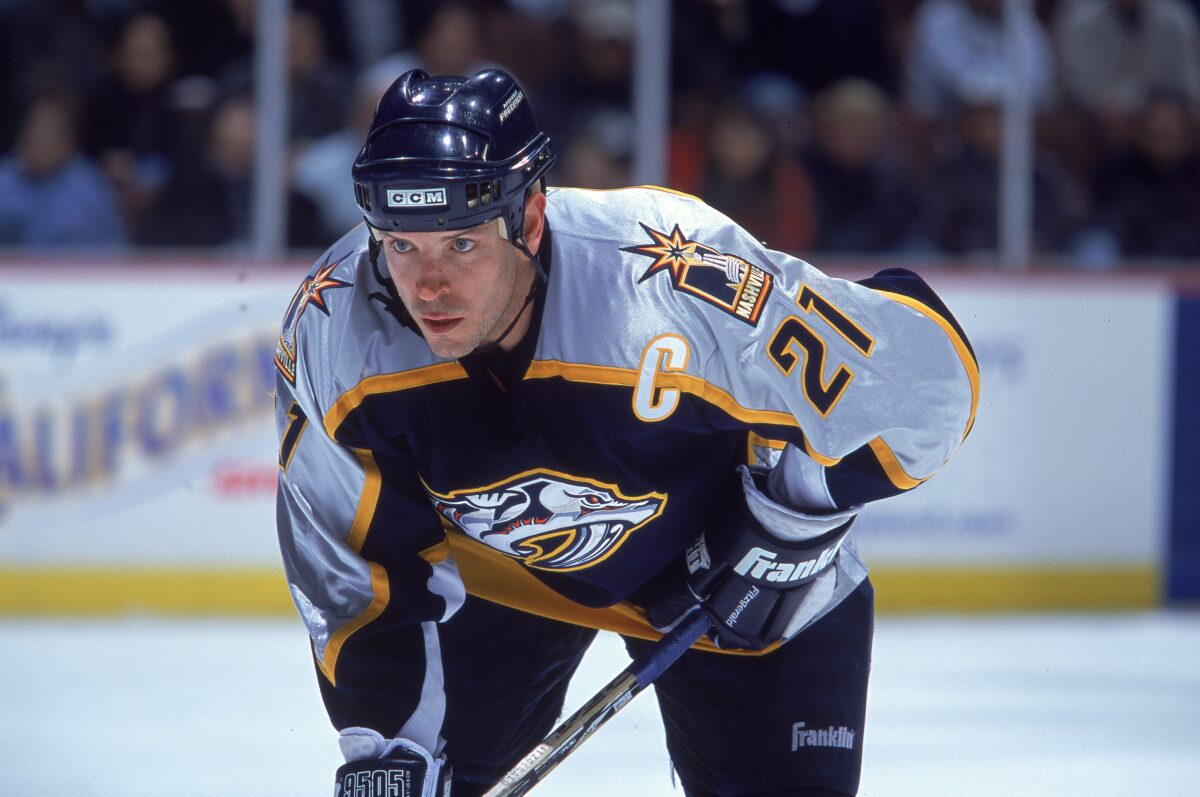The Nashville Predators began their play in the NHL during the 1998-99 season. They added quite a bit of significant talent to their debut campaign. They brought in forward Cliff Ronning from the Phoenix Coyotes; and received significant offensive contributions from other players like Greg Johnson, Sergei Krivokrasov, Andrew Brunette, and Scott Walker among others. One of the biggest leaders added to the group in the first season came from winger Tom Fitzgerald.
Before Fitzgerald became an executive who is currently the general manager (GM) of the New Jersey Devils, he was a journeyman forward who had previously suited up for the New York Islanders, Florida Panthers, and Colorado Avalanche; before officially going to Nashville prior to the 1998-99 season. Before heading to the expansion franchise, Fitzgerald had been known as someone who could put up good complementary numbers. Some of his best statistical campaigns happened while he was with the Panthers. In 1993-94, he tallied 18 goals and 14 assists for 32 points in 83 games. He also notched 34 points in 1995-96 with 13 goals and 21 assists in 82 games.
Then-Predators GM David Poile signed Fitzgerald as a free agent. It was a very smart decision, as his leadership skills helped establish the organization during their early seasons in the league.
First Captain of the Predators
Fitzgerald was named the franchise’s first captain and finished his first season as a Predator with 32 points in 80 games (13 goals and 19 assists). That was good enough for him to be ranked sixth on the team in scoring. Only Ronning (53 points), Johnson (50), Krivokrasov (48), Sebastien Bordeleau (40), and Walker (40), had more than he did.

As one of the veteran faces in the Predators locker room, he was able to be a solid presence for some of the younger players who were up-and-coming, like defenseman Kimmo Timonen (who was 23 years old at the time of the first Predators campaign), Brunette (25 years old), Bordeleau (23 years old), and many others.
Related: History of the Nashville Predators Captains
Fitzgerald laid down leadership qualities, which were a nice example for teammates like Johnson and Timonen. Johnson became the second captain of the club from 2002-06 and Timonen was captain for the 2006-07 season. Both players were in the locker room while Fitzgerald captained the Predators.
Fitzgerald Did Not Have to Be an Offensive Force
The role of goal scorer was covered by Fitzgerald’s teammates while he was there. He did not have to be an offensive force for the club. He knew what his role was on the ice and did a great job with it. While in Nashville, Fitzgerald posted the following numbers:
- 1998-99: 13 goals and 19 assists for 32 points in 80 games
- 1999-2000: 13 goals and nine assists for 22 points in 82 games
- 2000-01: nine goals and nine assists for 18 points in 82 games
- 2001-02: seven goals and nine assists for 16 points in 63 games
Fitzgerald’s offensive production decreased with each season in Nashville, but he still was a great leader for the rest of the group. He did not have to put up great offensive stats to be one of the pivotal figures on the team. Other teammates of his on the Predators like Ronning, David Legwand, Patric Kjellberg, and Timonen on the backend handled more of the scoring. Fitzgerald helped get the best out of his teammates who could rack up more production.
Trade to Chicago, Rest of Playing Career, and Devils GM
In the middle of the 2001-02 campaign, Fitzgerald was dealt to the Chicago Blackhawks. The full trade was Fitzgerald for a fourth-round pick in the 2003 NHL Entry Draft and future considerations. Unfortunately, while Fitzgerald was with the Predators, they never did make the playoffs. However, his former teammates in Nashville helped lead the way into clinching their first postseason appearance in 2003-04.
Fitzgerald played 15 games with Chicago, where he netted one goal and provided three assists for four points during the rest of that season. He also suited up for two seasons with the Toronto Maple Leafs and wrapped up his career as a member of the Boston Bruins in 2005-06. In 1,097 games, Fitzgerald amassed 139 goals and 190 assists for 329 points.
Since retiring as a player in 2006, Fitzgerald has been involved in management positions. He was with the Pittsburgh Penguins and eventually took over as GM of the Devils after Ray Shero was let go. He has brought in superb players since taking over that role, such as inking defenseman Brett Pesce to a long-term contract and also signing blueliner Brenden Dillon. He is also responsible for adding Jacob Markstrom via trade, bringing in Timo Meier from the San Jose Sharks, and signing Dougie Hamilton to a seven-year deal as a free agent. He is still building the Devils to what he hopes will be that organization’s fourth Stanley Cup championship.
Looking back on the Predators’ existence since 1998, there have been many key figures in the franchise’s history. Poile and Barry Trotz are two of the first names who come to mind, while newcomers like Steven Stamkos and Jonathan Marchessault are about to make their mark come 2024-25. However, one of the first players to stamp their place in the history of the club was Fitzgerald. He was admired for his leadership abilities, and he did what was asked of him while he was in Nashville. There have been many great captains for the Predators like Shea Weber and Roman Josi, but the first one to start it all will always be Fitzgerald.
